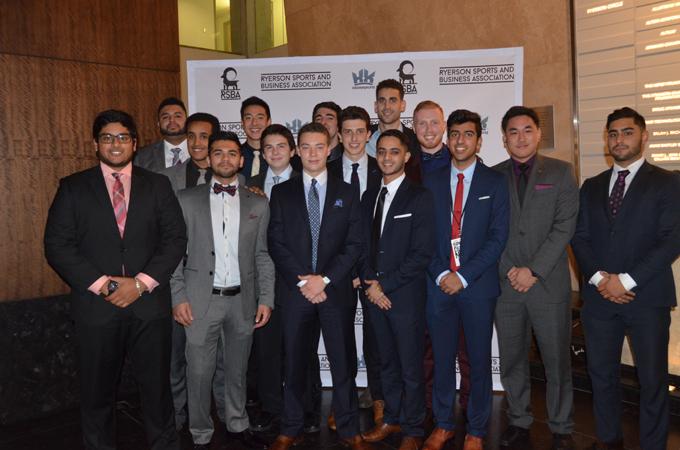By: Zeinab Saidoun
*Disclaimer: Dylan Freeman-Grist a participant of the Ryerson Speech and Debate Association, is also the communities editor at the Eyeopener. While not interviewed for the story, he did take part in the event Wednesday night.
The Ryerson Sports and Business Association (RSBA), Ryerson Commerce and Government Association (RCGA) and Ryerson Speech and Debate Association (RSDB) collaborated to hold an event Wednesday evening.
Sports Debate Night was put together to shine a light on the current state of concussion and mental illness regulation in sports. Industry professionals, doctors, and lawyers joined to answer questions about the reality of this issue.
“Concussions are a hot topic right now, you’ve got the legislation with the NHL and NFL,” said Stefan Kollenberg, Co-Vice President of corporate relations of RSBA. “I myself have had three concussions from playing rugby and hockey. I think we need to raise awareness around them.”
The event wasn’t all talk and facts. The student groups partnered with Parachute Canada, Grandstand, On Point Basketball and Hockey Kong. Attendees were able to purchase raffle tickets to win some awesome prizes such as a signed DeMar DeRozan jersey, Toronto Raptors Tickets and Toronto Maple Leaf tickets.
A debate by Ryerson students kicked off the event. The Crown was Dylan Freeman-Grist, the communities editor at The Eyeopener, and Thomas Halehail. On the opposition were Zack Korn and Rahul Parmar.
“If I love diving into the shallow end, it doesn’t mean you should let me, because that is dangerous,” said Halehail. “We can’t just let people endanger themselves, put themselves in harm’s way just because they love the sport.”
Parachute Canada, a charitable organization dedicated to preventing these head injuries was one of many partners. They explained that each year in Canada, preventable injuries cause 16,000 deaths and more than 60,000 disabilities.
“We shouldn’t ban an athlete who has spent all their life playing the sport after just one concussion,” argued Parmar. “Fix the equipment and fix the problem.”
According to the debaters, one of the issues is a player hiding their injuries and “manning up” because of stigmas in sports.
“They try to get away with things that could harm them,” said Freeman-Grist during the debate. “We must make changes that protect professional athletes, whom we know and love so that they can play for their entire careers.”
Following the debate was a panel discussion lead by industry professionals. The three panelists were Layth Gafoor, Dr. Eric Massicotte and Dr. Shree Bhalerao. Taniel Currie was their moderator.
“Helmets don’t necessarily prevent concussions,” said Dr. Massoicotte. “Ramping up the equipment is not going to cut it.”
Responsibility is also a huge game changer when it comes to the well being of players.
“Everyone’s responsible. In many cases, the doctor tells the athlete to sit out and the parents get a separate doctor who clears them,” said Gafoor. “The player has to protect themselves.”
Dr. Bhalerao speaks on the topic of the stigma around weakness. “As soon as you show any kind of weakness, especially mental illness, you’re done.”
He also touches on the psychological damage and the results of getting multiple concussions. “Psychologically, you can use stats like doubling your risk of mental illness,” he said. “You’re close to doubling your risk to suicide.”
Bhalerao explains that such consequences have years of turmoil that unfortunately don’t go away.










Leave a Reply